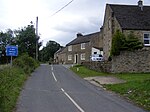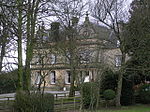Kirby Hill, Richmondshire

Kirby Hill, historically also known as Kirby-on-the-Hill, is a village and civil parish in the Richmondshire district of North Yorkshire, England. The village is about 1 mile (1.6 km) south of Ravensworth and about 4 miles (6 km) north-west of the town of Richmond. The parish population is about 60. At the 2011 census, it was less than 100. Population data about Kirby Hill is now included in population data about the parish of Gayles. Kirby Hill was a township in the parish of Kirkby Ravensworth until 1866, when it was made a separate civil parish.As early as 1859, the centre of the village green featured "a beautiful spring". It continued to be used by residents until at least 1932. Sir Nikolaus Pevsner described Kirby Hill as "a perfect village, but ... also ... exceptional".
Excerpt from the Wikipedia article Kirby Hill, Richmondshire (License: CC BY-SA 3.0, Authors, Images).Kirby Hill, Richmondshire
Geographical coordinates (GPS) Address Nearby Places Show on map
Geographical coordinates (GPS)
| Latitude | Longitude |
|---|---|
| N 54.45417 ° | E -1.785 ° |
Address
DL11 7JJ , Kirby Hill
England, United Kingdom
Open on Google Maps










